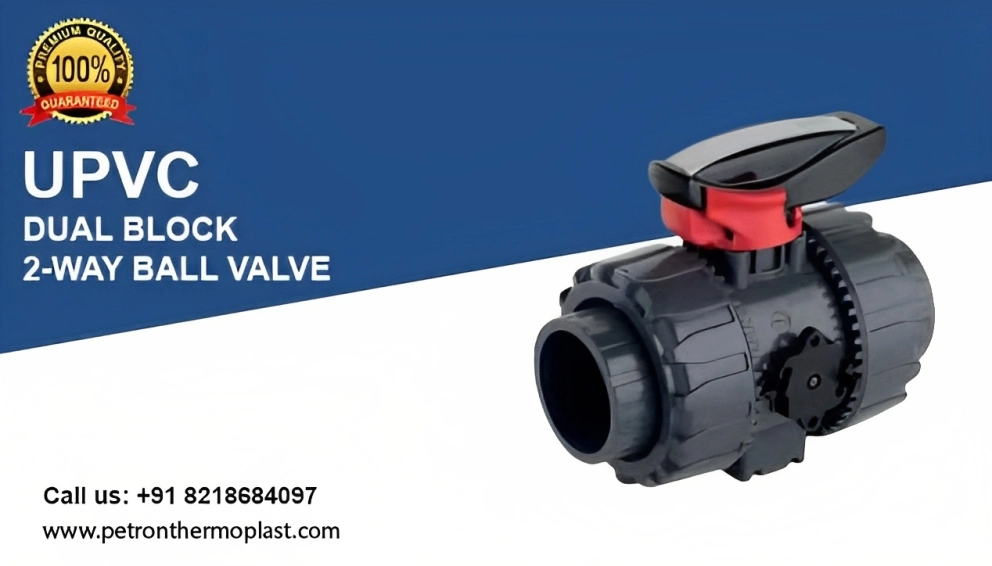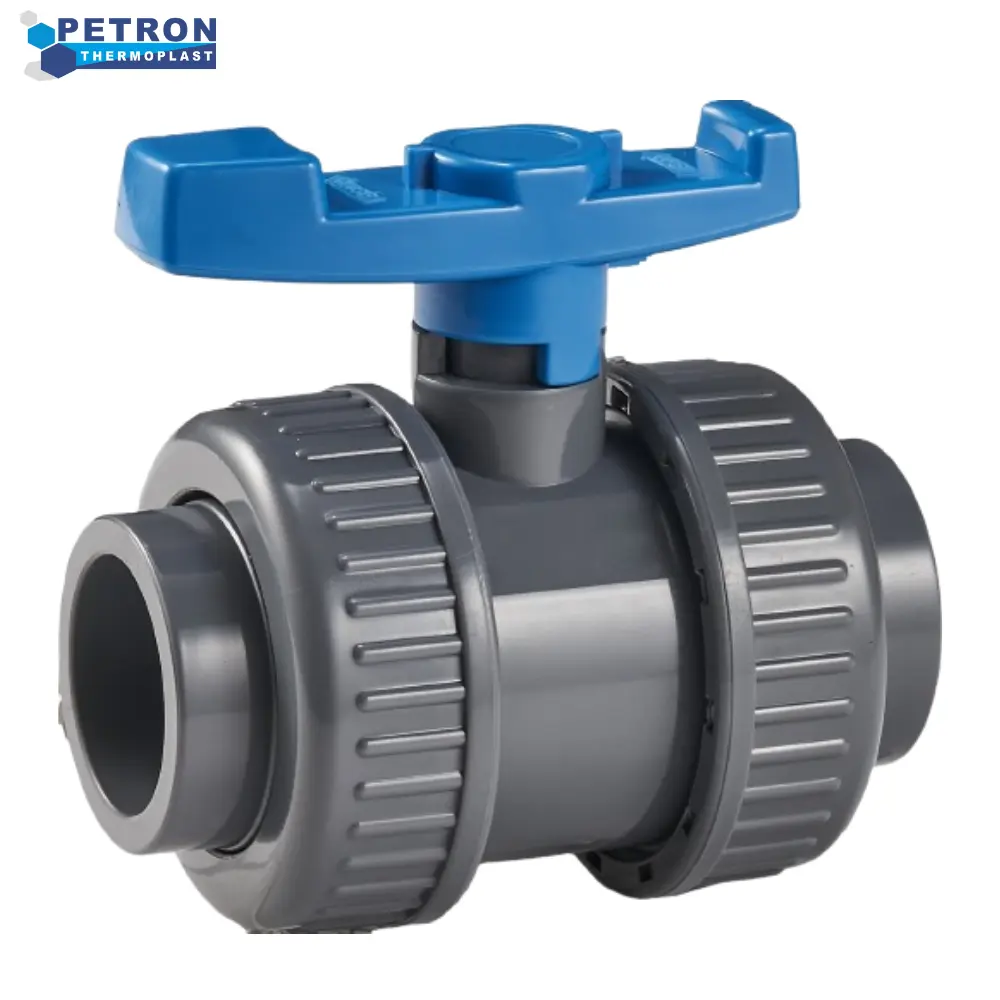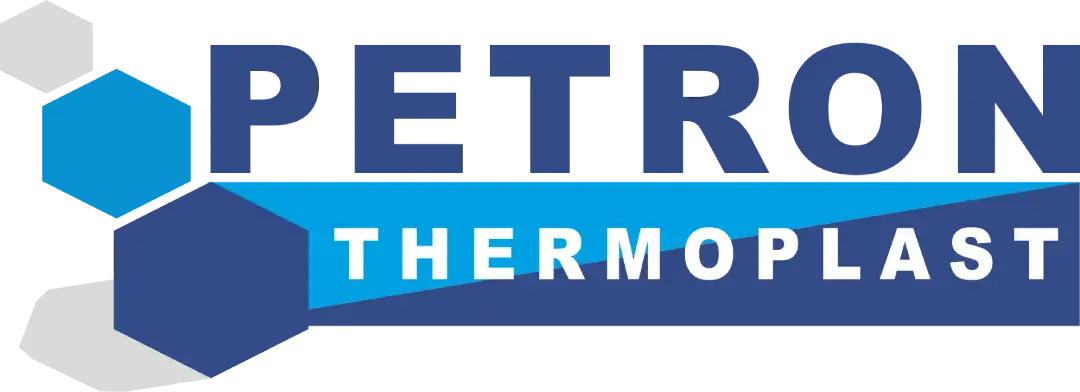

PVC Ball Valves Manufacturer & Supplier
PVC ball valves are broadly utilized plastic closed-off valves. The valve contains a rotational ball with drag at the middle. By moving the ball a quarter-turn, the bore can be adjusted inline or opposite to the funneling to open or impede the media’s flow.
PVC ball valves are solid, practical, and utilized for a wide assortment of media, including water, air, destructive synthetics, acids, and bases. Contrasted with metal or treated steel ball valves, they have lower temperature and pressing factor obstruction and lower mechanical strength. They are accessible with various funneling associations, like dissolvable attachments (stick association), distinctive spine types, or line strings.
What is a PVC Ball Valve?
A PVC (Polyvinyl Chloride) Ball Valve is a type of shut-off valve that controls the flow of liquids or gases through a piping system using a rotating ball with a hole (bore) in the center. When the handle is turned 90 degrees, the ball rotates, either allowing or blocking the flow.
PVC ball valves are widely used in residential, commercial, and industrial applications due to their durability, lightweight design, and excellent chemical resistance. They are ideal for water supply systems, chemical processing, irrigation, and wastewater treatment.

PVC Ball Valve: Specifications (Fittings and Pipes)
| – | Fittings | Pipes |
|---|---|---|
| Material | Unplasticized Polyvinyl Chloride (UPVC) with U.V. Resistance | Unplasticized Polyvinyl Chloride (UPVC) with U.V. Resistance |
| Colour | White | White |
| Refernce Standards | Sch- 80 as per ASTM D- 2467 Sch- 40 as per ASTM D- 2466 | Sch- 40 , 80 & 120 s per ASTM D- 1785 |
| Working Temperature | Upto 60 degree- Continous Upto – 90 degree- Short Time- upto 3 mins | Unplasticized Polyvinyl Chloride (UPVC) with U.V. Resistance |
| End Connections | Solvent sockets. For transition joints, fittings with plastic threaded & metal threaded inserts available | Solvent Joint |
PVC Ball Valve Maintenance and Longevity Tips
To ensure the long-term durability and efficiency of your PVC Ball Valves, proper maintenance is essential. Here are some expert tips to maximize their performance and lifespan.
1. Regular Inspection
- Check for leaks, cracks, or discoloration in the valve body and seals.
- Ensure smooth rotation of the ball valve handle.
2. Clean Periodically
- Flush the valve with clean water to remove debris or buildup.
- Use mild detergent and a soft cloth for external cleaning.
3. Avoid Over-Tightening
- Do not force the valve handle beyond its limit.
- Use gentle pressure to prevent damage to internal seals.
4. Lubricate Moving Parts
- Apply silicone-based lubricant for smooth operation.
- Avoid petroleum-based lubricants, as they may damage PVC.
5. Protect from UV Exposure
- If installed outdoors, use UV-resistant coatings or covers.
- Consider buried or shaded installations for longer life.
6. Maintain Proper Temperature & Pressure
- Do not exceed recommended pressure ratings.
- Ensure fluid temperatures remain within the PVC tolerance range.
7. Drain Before Long-Term Storage
- If not in use, drain the valve completely to prevent internal residue buildup.
- Store in a cool, dry place away from direct sunlight.
8. Replace Worn-Out Parts
- If seals or gaskets show signs of wear, replace them promptly.
- Use manufacturer-approved replacement parts for compatibility.
Ensure Proper Installation
- Use PTFE thread seal tape to prevent leaks at connections.
- Install with correct pipe alignment to avoid stress on the valve body.
PVC Ball Valve Information About Product
PVC ball valves are broadly utilized plastic closed-off valves. The valve contains a rotational ball with drag at the middle. By moving the ball a quarter-turn, the bore can be adjusted inline or opposite to the funneling to open or impede the media’s flow.
PVC ball valves are solid, practical, and utilized for a wide assortment of media, including water, air, destructive synthetics, acids, and bases. Contrasted with metal or treated steel ball valves, they have lower temperature and pressing factor obstruction and lower mechanical strength. They are accessible with various funneling associations, like dissolvable attachments (stick association), distinctive spine types, or line strings.
Types of PVC Ball Valve
A 2-way ball valve is a straight ball valve with 2 ports, a delta, and an outlet. The media just streams a single way in such valves, and they are considered in line with the remainder of the get-together.
A 3-way ball valve is the most normally utilized multiport valve. This valve has 3 ports and has two plan types “L-port and T-port”. This alludes to the drag plan in the ball, which is the way of the media stream.
True union or double Union valves have separate line association closes fixed to the valve body by a strung association. A genuine association ball valve with attachments and a manual handle is the most well-known. The valve can be handily eliminated for substitution, investigation, and cleaning.
Properties of PVC Ball Valve:
- Immune to numerous synthetic substances, acids, and bases.
- Frequently utilized for clean applications, like drinking water. PVC is a significant material used to store or move food items..
- Recyclable and moderately low effect on the climate in correlation with different plastics.
- Most PVC ball valves up to DN50 have the greatest pressing factor rating of PN16 (16 bar at room temperature).
- Lightweight, tough, and long assistance life.
- No issue of corrosion.
Here we shall discuss the property of PVC valve
- It is lightweight, durable, and long-lasting.
- The valves do not face any issue of corrosion.
- The pipe is immune to numerous synthetic substances, acids, and bases.
- The pipes are randomly utilized for clean applications, like drinking water.
Applications of PVC Ball Valves:
PVC valves are utilized in a wide scope of business and private applications. They are as follows:
- Water highlights and wellsprings.
- Substance handling.
- Food handling.
- Water treatment.
- Aquariums.
- landfills.
- Pools.
See more UPVC Valves Manufacturer in India at Petron Thermoplast.
The largest PVC ball valve manufacturer and supplier in India
PVC ball valves are in-general utilized plastic closed-off valves. There is a rotational ball with drag at the middle in a valve. When you move the ball a quarter-turn, the bore is adjusted in-line or against the funnelling to open or obstruct the media’s flow.
The ball valves are practical, solid, and used for a wide assortment of media, including air, water, destructive synthetics, acids, and bases. It is collated with metal or treated steel ball valves; they have minimum temperature and pressing factor obstruction and lower mechanical strength. You can access them with funneling associations like distinctive spine types, dissolvable attachments, or line strings.
Now we need to check the specifications of ball valves for fittings and pipes.
For fittings
- The PVC valve consists of Unplasticized Polyvinyl Chloride (UPVC) materials with U.V. Resistance that comes white in colour.
- The product has certain reference standards, such as Sch- 80 per ASTM D- 2467 and Sch- 40 per ASTM D- 2466.
- The ball valves act in certain working temperatures: Upto 60 degrees- Continuous, Upto 90 degrees- Short Time- upto 3 minutes.
- The end connection of PVC valves has end connections of solvent sockets.
For pipes
- The PVC valve consists of Unplasticized Polyvinyl Chloride (UPVC) materials with U.V. Resistance that comes white in colour.
- The product has certain reference standards such as Sch- 40, 80 & 120 s per ASTM D- 1785.
- It comes with end connections of solvent joints.
PVC ball valve information about the product
PVC ball valves are in-general utilized plastic closed-off valves. There is a rotational ball with drag at the middle in a valve. When you move the ball a quarter-turn, the bore is adjusted in-line or against the funnelling to open or obstruct the media’s flow.
The ball valves are practical, solid, and used for a wide assortment of media, including air, water, destructive synthetics, acids, and bases. It is collated with metal or treated steel ball valves; they have minimum temperature and pressing factor obstruction and lower mechanical strength. You can access them with funneling associations like distinctive spine types, dissolvable attachments, or line strings.
Now we need to check the specifications of ball valves for fittings and pipes.
Features of PVC Ball Valve
PVC Ball Valves are widely used for fluid control in residential, commercial, and industrial applications. Here are the key features:
• Corrosion & Chemical Resistance
• Lightweight & Durable
• Leak-Proof Design
• Smooth & Easy Operation
• Cost-Effective
• High Flow Efficiency
• UV & Weather Resistance
• Versatile Applications
Benefits of PVC Ball Valves
PVC Ball Valves provide durability, efficiency, and cost-effectiveness, making them a preferred choice for various fluid control applications. PVC Ball Valves are widely used for fluid control due to their numerous advantages over traditional metal valves. Below are the key benefits:
• Corrosion & Chemical Resistance
• Cost-Effective
• Lightweight & Easy to Install
• Leak-Proof & Reliable Performance
• Smooth & Effortless Operation
• Energy Efficient & High Flow Capacity
• UV & Weather Resistant
• Low Maintenance & Long Service Life
• Versatile Applications
• Eco-Friendly Option
Why Choose Petron Thermoplast as a Best PVC Ball Valves Supplier?
When it comes to high-quality PVC Ball Valves, Petron Thermoplast stands out as a trusted manufacturer and supplier. With high-quality manufacturing, a wide product range, competitive pricing, and expert support, Petron Thermoplast is the go-to choice for PVC Ball Valves. Whether for residential, industrial, or commercial applications, our valves ensure smooth flow control, durability, and efficiency. Here’s why choosing Petron Thermoplast for your PVC Ball Valve needs is the best decision:
• Superior Quality & Durability
• Wide Range of PVC Ball Valves
• Leak-Proof & Efficient Design
• Cost-Effective & Low Maintenance
• Compliance with International Standards
• Customization Options Available
• Fast Delivery & Reliable Supply Chain
• Expert Technical Support
• Trusted by Industries Worldwide
• Eco-Friendly & Sustainable Products
Final Conclusion
PVC Ball Valves are an essential component in modern piping systems, offering corrosion resistance, durability, and cost-effectiveness. Their lightweight design, ease of installation, and reliable performance make them ideal for applications in chemical processing, water treatment, irrigation, and industrial fluid handling. At Petron Thermoplast, we provide high-quality PVC Ball Valves designed for long-lasting performance and optimal flow control.
Our valves undergo strict quality checks to ensure leak-proof operation, chemical resistance, and high durability. Whether you need standard or customized solutions, our expertise ensures you get the best product for your applications. Choose Petron Thermoplast for premium PVC Ball Valves and experience superior quality, reliability, and efficiency in every use! Contact us today to learn more.
FAQ's
Industry Solution For Engineering Plastic Components
A PVC Ball Valve is a type of valve made from Polyvinyl Chloride (PVC), designed to control fluid flow in a pipeline. It features a rotating ball with a bore that opens and closes to regulate the passage of liquids or gases.
- Corrosion Resistance – Ideal for handling chemicals and water-based fluids.
- Lightweight & Durable – Easy to install and long-lasting.
- Cost-Effective – More affordable compared to metal alternatives.
- Leak-Proof Design – Ensures tight sealing and prevents leakage.
- Low Maintenance – Requires minimal servicing for optimal performance.
PVC Ball Valves are widely used in:
- Water Treatment Plants
- Chemical Processing Units
- Irrigation & Agriculture
- Swimming Pools & Aquariums
- Industrial Fluid Handling Systems
- Regularly inspect for wear and leaks.
- Clean the valve to remove debris or buildup.
- Avoid exposure to extreme temperatures beyond the recommended range.
- Lubricate moving parts if needed.
Yes, but it depends on the pressure rating of the valve. Standard PVC Ball Valves work well in low to medium pressure systems. For high-pressure applications, specialized industrial-grade PVC Valves are recommended.
Yes, PVC Ball Valves made from NSF-certified, lead-free, and food-grade materials are safe for potable water applications.
Consider factors like:
- Valve Size (Diameter of the pipeline)
- Pressure & Temperature Ratings
- Chemical Compatibility with fluids
- End Connection Type (Threaded, Solvent Weld, or Flanged)
Petron Thermoplast offers:
- Premium Quality & Certified Products
- Wide Range of Sizes & Specifications
- Competitive Pricing & Fast Delivery
- Expert Support for Customized Solutions
This Post Has 7 Comments
Comments are closed.

Pingback: Top Quality PVC Ball Valves for Industrial Applications
Pingback: PVC Ball Valves – Simplifying Fluid Control Systems - TheStarBizNews
Pingback: Petron Thermoplast – Leading Manufacturer of PVC Ball Valve – BDnews55.com
Pingback: PVC Ball Valves – Improve Industrial Fluid Handling – Collection Of Blogs
Pingback: PVC Ball Valves – Durable and Cost Effective Solution – Bambola
Pingback: Top Quality PVC Ball Valves for Industrial Applications – Article Productions
Pingback: Best Quality PVC Ball Valve for Industrial & Chemical Use